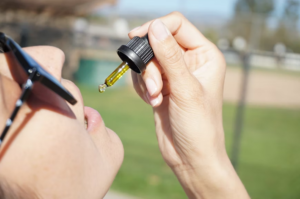Nurturing and protecting one’s mental health is as vital as taking care of one’s physical health. Our mental health could need some extra support sometimes, but often it can be as simple as talking with a friend.
Several studies have recently studied the usage of CBD to enhance sound mental health. Cannabis plants contain a naturally occurring compound called CBD (cannabidiol). Contrary to its more well-known cannabinoid cousin THC, CBD does not cause intoxication, and some people claim it can improve attention and concentration.
CBD is believed to calm the brain and support the hippocampus, a memory-and-emotion-processing area of the brain. Taking CBD daily can boost your well-being and keep you mentally healthy. CBD is known to optimize both physical and mental health.
Observations suggest that CBD boosts the human endocannabinoid system (ECS). ECS refers to the extensive network of receptor sites found in the stomach, brain, and peripheral and central nervous systems. The endocannabinoid system governs every element of human health, including hunger, reproduction, mood, sleep, cell development, and the immune system.
Below is an in-depth analysis of how CBD can promote mental wellness.
CBD and Anxiety
In a 1990 study, researchers discovered that CBD reduced the behavioral and mental signs of stress and anxiety in rats. A recent replication of this study expanded on the potential neurological mechanisms that CBD could stimulate.

In another promising study, CBD has also been shown to reduce social phobia sufferers’ fear of public speaking (social anxiety). When participants were given CBD before a public speaking simulation, anxiety, cognitive impairment, and discomfort significantly reduced.
Overall, it appears that CBD may be effective for various anxiety conditions.
A great way to enjoy CBD while reaping its benefits for depression is through gummies. You can easily find CBD gummies or in select countries where CBD is legal. Gummies for depression are also a great way to reminisce about your childhood when you had little or no worry.
It Might Aid in Combating Depression
CBD might offer hope as a possible therapy for depression and an alternative to traditional antidepressants because it has reportedly been demonstrated to induce activation of the 5-HT1A serotonin receptor.
Although there haven’t been many human trials into this, several animal research has shown encouraging findings. One study, for instance, examined the effects of CBD on rats and discovered that it had antidepressant-like effects.
Crossbred rats exhibiting depression-like syndromes were subjected to a ‘forced swimming test.’ Rats administered with a dosage of CBD displayed decreased “immobility time,” behavior associated with antidepressants.
Protection Against Neurological Illnesses and Diseases
Preclinical and clinical investigations have shown that CBD has antioxidant and anti-inflammatory properties. Researchers claim these traits can provide significant neuroprotection or defense against various clinical disorders.

Parkinson’s disease, Alzheimer’s disease, and multiple sclerosis all have been proven to be successfully treated by CBD in preclinical studies. However, further clinical study is required to validate CBD’s effectiveness as a treatment for these illnesses.
ALS Risk and Symptoms Reduction
In amyotrophic lateral sclerosis (ALS), nerve cells in the brain and spinal cord deteriorate, resulting in a progressive loss of muscle control. Although ALS may occasionally have a hereditary component, its specific origin is yet unclear. Only two FDA-approved medications are available for treating ALS symptoms, and there is no known cure for the disease.
Researchers have found that the entourage effect caused by THC and CBD may benefit people with ALS. Participants in a 2019 study received different doses of THC and CBD according to their preferences and requirements.
The treatment was highly satisfactory for patients with mild, moderate, and severe spasticity (muscle stiffness and tightness) associated with ALS, with moderate and severe spasticity reporting higher satisfaction scores than mild spasticity.
Can Help With Addiction Therapy
There is evidence that CBD may be able to help those addicted to opioids, including preclinical animal studies and clinical trials in humans. In one such test, CBD was administered to individuals with a heroin use disorder.
Over the course of a week, CBD greatly decreased cue-induced cravings, withdrawal anxiety, resting heart rate, and salivary cortisol levels in heroin addicts. No significant side effects were found.

Other researchers have found that CBD may effectively treat psychological and physical symptoms, including pain, insomnia, and anxiety in people with drug use disorders, indicating that CBD may be a good alternative for treating opiate addiction. More research is needed, though.
CBD Oil for PTSD
Taking CBD may provide some assistance for those who have post-traumatic stress disorder. According to a National Center for Biotechnology Information study, it lessened unwarranted reactions to painful memories. Unexpectedly, cannabidiol is claimed to have fewer adverse effects than pharmaceutical treatment for PTSD. Nonetheless, additional research is needed to confirm cannabidiol’s effects on PTSD.
Conclusion
In summation, considerable research indicates that CBD may be helpful for a range of mental health issues. However, the majority of CBD products that are sold commercially come with a lot of uncertainties and hazards. Furthermore, quality and appropriate dose cannot be guaranteed due to the lack of control and regulation for CBD products. It is advisable to discuss any potential adverse effects or interactions with other drugs with a licensed physician if you are interested in taking CBD.
